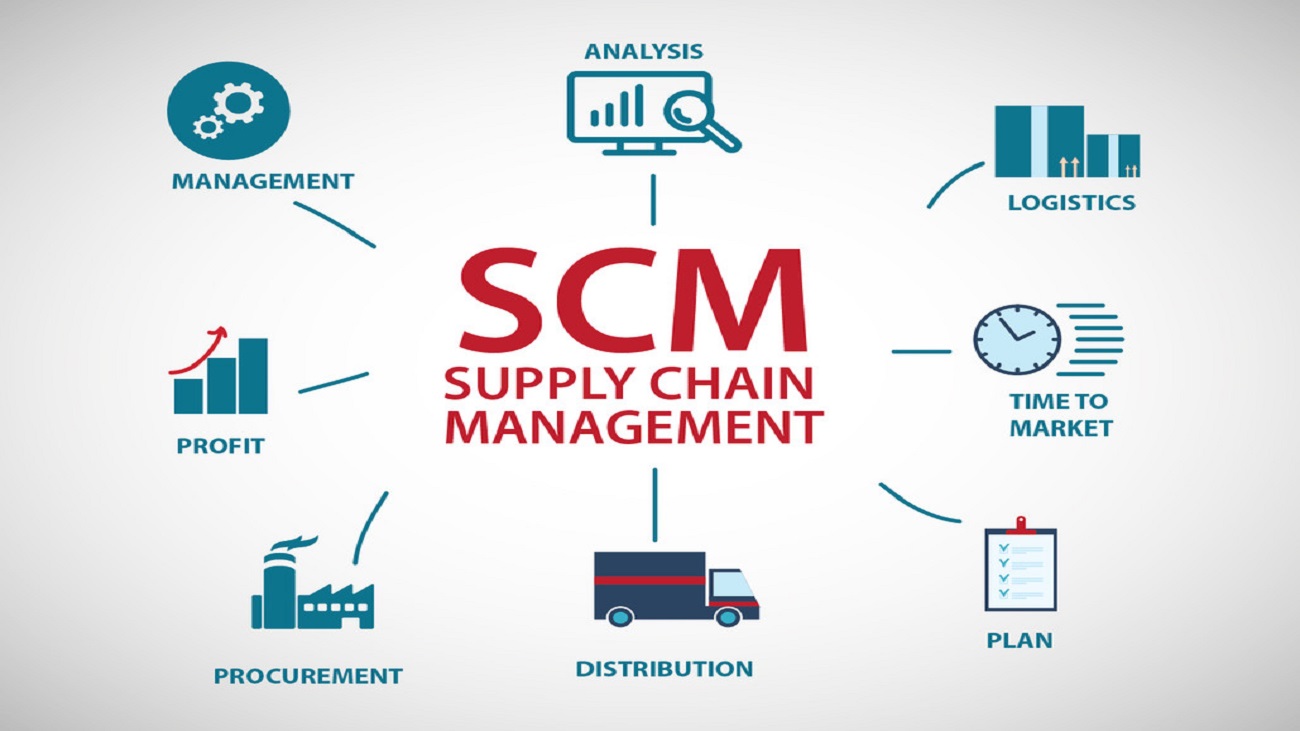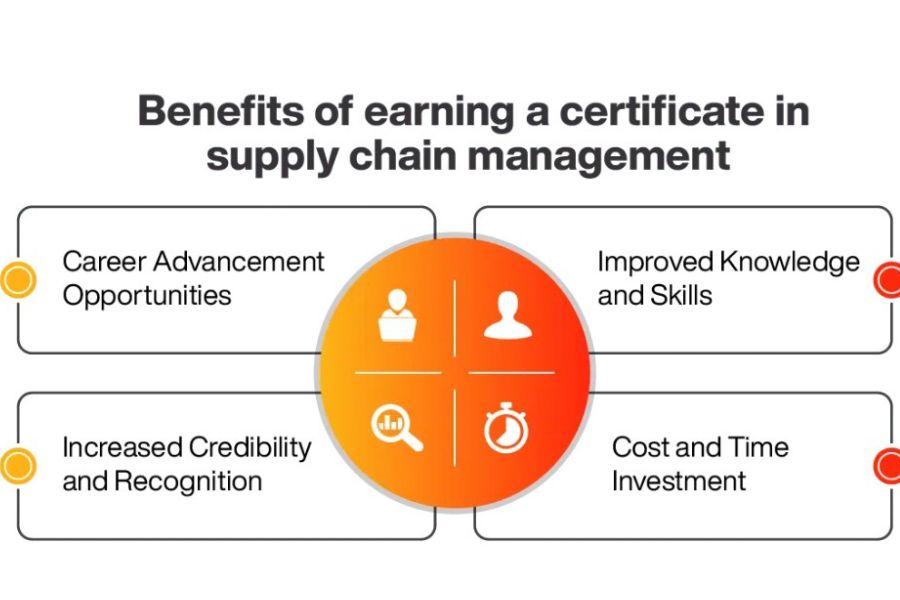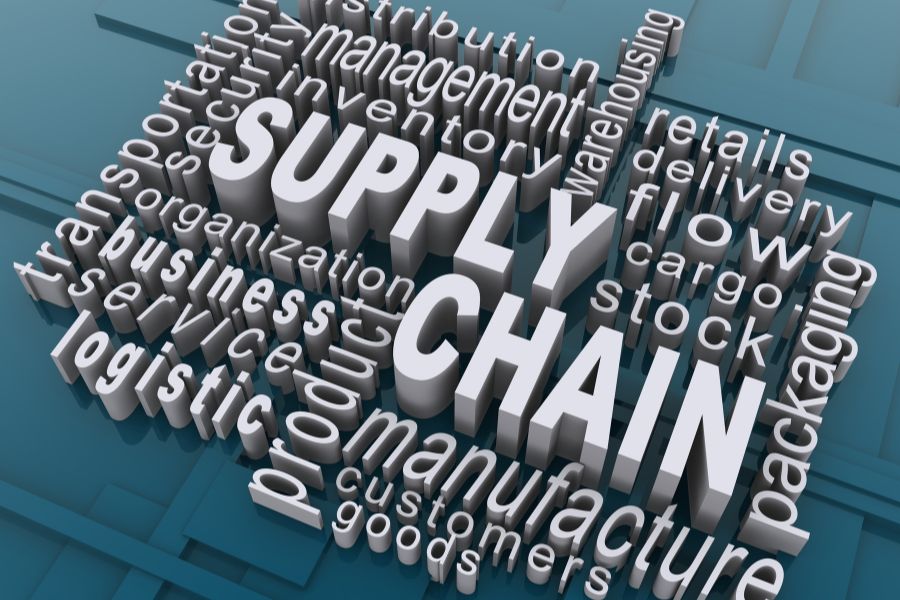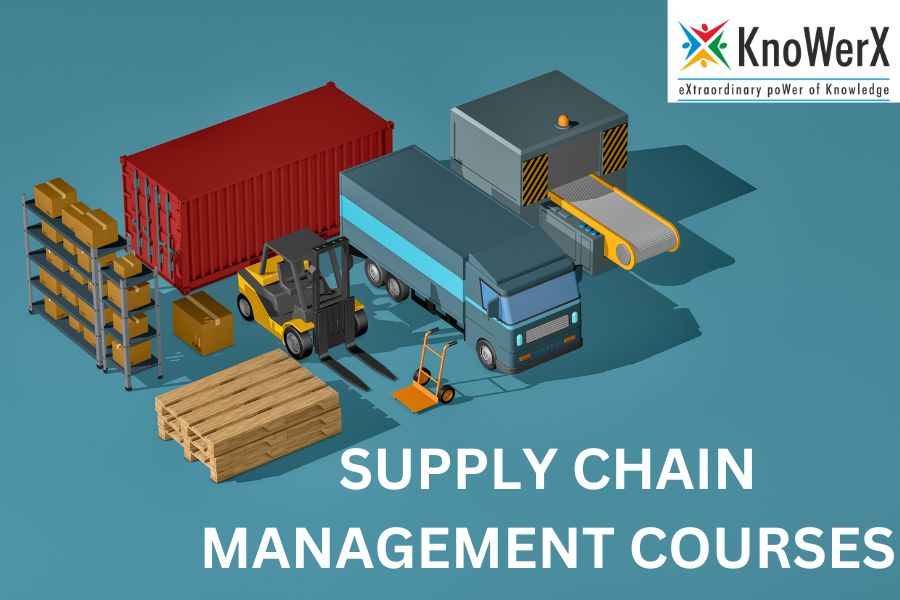Navigating Supply Chain Management Courses in India: Opportunities, Careers, and Costs
Over the past few years, businesses in India have seen big changes. This shift has been driven by things like companies going global, new technology, and what people want to buy. One big part of this change is Supply Chain Management (SCM). SCM is all about making sure things get from where they start, like raw materials, to where they’re needed, like the end customer.
In this article, we’ll talk about why SCM is so important for businesses in India and look at the many courses available to help people learn the skills they need to work in this fast-changing field. These courses are known as Supply Chain Management Courses.
What Is Supply Chain Management Course?

Understanding Supply Chain Management Courses
Supply Chain Management Courses cover a wide range of topics aimed at helping us understand, improve, and oversee the connected activities involved in getting products and services to customers. These courses typically cover areas like buying, shipping, keeping track of inventory, predicting demand, managing relationships with suppliers, and integrating sustainable practices into the supply chain.
In India, there are many options for studying Supply Chain Management Courses. These courses are available at universities, colleges, specialized training centers, and online platforms. They cater to people at different points in their careers, whether they’re just starting out, already working, or executives looking to boost their skills in Supply Chain Management.
Why Supply Chain Management Education Matters
In today’s fiercely competitive business world, having a strong grasp of Supply Chain Management is crucial for companies to stay ahead, improve how they operate, and meet customer needs. As businesses work to make their supply chains more efficient, flexible, and resilient, there’s a growing need for professionals who have the specialized knowledge and skills in Supply Chain Management.
Types Of Supply Chain Certifications
Overview of Different Certifications:
- Certificate Programs: These are short-term courses designed to give you basic knowledge in Supply Chain Management (SCM). They cover important topics like procurement, keeping track of inventory, and managing logistics.
- Diploma Courses: These are more detailed than certificate programs. They dive deeper into SCM, giving you a better understanding and practical skills in different areas.
- Professional Certifications: These are like badges of expertise in SCM. Certifications like Certified Supply Chain Professional (CSCP) or Certified in Production and Inventory Management (CPIM) are recognized worldwide. They show you’ve got specialized knowledge in certain aspects of SCM.
- Postgraduate Degrees: These are advanced degrees like an MBA or PGDM, but with a focus on supply chain management. They not only teach you SCM concepts but also give you management skills to handle it effectively.
Comparison of Certification Programs and Their Focus Areas:
- Curriculum: Each certification program might focus on different parts of SCM. Some might concentrate on procurement, others on logistics, demand forecasting, or even sustainability.
- Duration and Format: The length of these programs can vary a lot. Some might only take a few weeks, while others could last for months or even years. They might be offered online, in a classroom, or a mix of both.
- Accreditation and Recognition: It’s really important to pick certifications from respected institutions or professional bodies. That way, you know they’re recognized by industry leaders and employers.
In short, when exploring Supply Chain Management Courses, consider what kind of certification suits your needs best, and make sure it’s recognized by the industry.
Why Supply Chain Management Course?

Benefits of Enrolling in a Supply Chain Management Course:
- Skill Improvement: Supply Chain Management Courses help individuals develop practical skills and knowledge essential for streamlining supply chain operations, cutting costs, and boosting effectiveness.
- Industry-Relevant Education: The curriculum of Supply Chain Management Courses stays updated with industry trends, ensuring learners acquire current knowledge and skills sought after by employers.
- Career Growth: Obtaining certification or a degree in Supply Chain Management opens up various job opportunities across industries like manufacturing, retail, e-commerce, and consulting, enhancing career prospects.
- Global Reach: As supply chains expand globally, professionals proficient in Supply Chain Management find opportunities for international career advancement and mobility.
How Supply Chain Management Education Improves Career Opportunities and Industry Relevance:
- Specialized Knowledge: Supply Chain Management Courses delve into areas such as inventory management, procurement strategies, supply chain analytics, and sustainable practices, making graduates highly desirable to employers.
- Networking Possibilities: Enrolling in Supply Chain Management Courses offers chances to connect with industry experts, professionals, and alumni, facilitating networking and career advancement.
- Leadership Growth: Advanced Supply Chain Management programs emphasize leadership and strategic management skills, preparing individuals for managerial and leadership roles within supply chain organizations.
- Adaptability and Resilience: In today’s fast-paced business world, Supply Chain Management education equips professionals with the flexibility and resilience needed to navigate disruptions, manage risks, and foster innovation within supply chains.
Why Supply Chain Management As A Career?
Exploring the Rising Demand for Supply Chain Professionals in India:
- Rapid Economic Growth: India’s economy is booming, which means supply chains are getting more complicated. That’s where skilled professionals come in handy, making sure everything runs smoothly.
- Globalization: Indian companies are going global, and international firms are setting up shop in India. This expansion means there’s a big demand for experts who can handle the complexities of global supply chains.
- Technological Advancements: Fancy tech like AI, IoT, and blockchain are changing how supply chains work. To keep up, we need professionals who know their way around these tools.
Discussing the Wide Range of Career Opportunities in SCM:
- Logistics Management: Think of it as the traffic controller of supply chains. You make sure everything gets from point A to point B on time, whether it’s by truck, train, or plane.
- Procurement: You’re the one who finds the best deals for the materials a company needs. It involves negotiating contracts and keeping good relationships with suppliers.
- Inventory Management: It’s all about finding that sweet spot between having enough stuff in stock and not having too much. You keep track of inventory levels to save costs while still meeting demand.
- Operations Management: Your job is to make everything run smoothly within the supply chain. You find ways to make processes more efficient, saving time and money.
- Supply Chain Analytics: Numbers are your best friend here. You use data to figure out what’s working well and what needs improvement in the supply chain.
And if you’re interested in diving deeper into this field, there are plenty of Supply Chain Management Courses out there to help you sharpen your skills and kick-start your career.
Supply Chain Management Certification Cost

Supply Chain Management Courses can be a valuable investment in your career, but it’s essential to understand the associated costs. Let’s break down what you might expect:
When it comes to the cost of Supply Chain Management Certification programs, there are a few key components to consider:
- Course Fees: The price of enrolling in these programs can vary widely depending on where you study, how long the program lasts, and what’s included in the curriculum.
- Exam Fees: Many certifications require you to pass an exam, which often comes with its own set of costs.
- Study Materials: You’ll also need to budget for textbooks, online resources, and study guides to help you prepare for your certification.
Several factors can influence the overall cost of certification and what financial aid options might be available to you:
- Institution Reputation: Certifications from well-known institutions may come with higher fees, but they can also carry more weight with potential employers.
- Mode of Delivery: Online courses tend to be more cost-effective than traditional classroom-based programs because they often have lower overhead costs.
- Financial Aid: Some institutions offer scholarships, grants, or payment plans to help students manage the cost of their certification.
At KnoWerX, we understand that investing in your education is important, which is why we offer comprehensive Supply Chain Management Courses to help you advance in your career. Our programs are designed to be accessible and affordable, with options for financial assistance for those who need it.
End Notes

In short, at KnoWerX, our Supply Chain Management Courses in India are crafted to be the starting point for success for people interested in excelling in the ever-changing world of operations and logistics. With our courses, students gain important skills, certifications, and knowledge about the industry. This helps them start on paths to successful careers with lots of chances to grow. Whether you’ve been working for a while or you’re new to the workforce and want to get into this field, signing up for one of our Supply Chain Management Courses could be the key first move toward a satisfying and successful career journey.
FAQs: Frequently Asked Questions
What is Supply Chain Management (SCM)?
A. Supply Chain Management is all about making sure things move smoothly from the suppliers to the customers. It’s like organizing a big puzzle where goods, services, and information need to flow efficiently. This includes tasks like getting the right stuff from suppliers, making things, managing how much stuff we have, and getting it to where it needs to go.
Why are Supply Chain Management courses important in India?
A. Supply Chain Management courses are really important in India because as the country grows and connects more with the world, there’s a big need for people who know how to manage these processes well. By learning about SCM, professionals can help companies save money, work better, and make sure things get to customers on time.
What types of Supply Chain certifications are available in India?
A. In India, there are different certifications you can get to show you know your stuff in Supply Chain Management. These include things like Certified Supply Chain Professional (CSCP), Certified in Production and Inventory Management (CPIM), and Certified Logistics Professional (CLP). Each certification is tailored to different levels of expertise and career goals in SCM.
What are the career prospects for individuals with Supply Chain Management certifications in India?
A. If you have a certification in Supply Chain Management in India, you’re set for a wide range of job opportunities. Industries like manufacturing, retail, online shopping, healthcare, and transportation all need people who understand SCM. You could find yourself working as a Supply Chain Analyst, Logistics Coordinator, Procurement Manager, Operations Manager, or even a Supply Chain Consultant. There’s plenty of room to grow and make a difference in these roles



